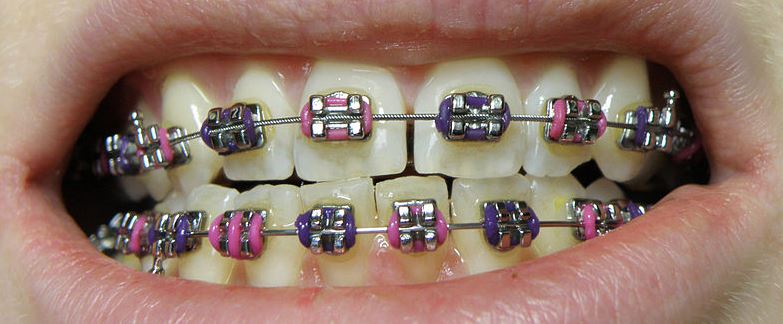There are about four million people in the United States who wear braces. Dental braces are devices that dentists use to align teeth. Furthermore, there are many types of braces to choose from: traditional braces, aligners, power-chain braces, ceramic braces, self-ligating braces, and lingual braces. Likewise, there are many orthodontic problems that braces can address. These are mismatched dental midlines, a tendency to bite the roof of the mouth, Periodontitis, pain in the jaw, head, and ear, early or late baby teeth, and bad breath.

Braces. Image Courtesy of MAKY.OREL
Read Also: Wisdom Teeth Removal Improves the Sense of Taste in the Long Run
But how do they work? According to Dr. Sam Smith of Super Smiles Orthodontist Boise braces gradually move the teeth into alignment to make a better foundation. It helps not only in the health of gums but also in producing a better environment for the teeth. Your teeth have four types of tissues, and if it’s properly aligned, they become sturdier. All in all, dental braces may be available for aesthetic or functional use. It’s aesthetically ideal as it straightens teeth, making the person look attractive. It can be for practical purposes as it has many health benefits.
So, if you want a closer look, here are the long-term health benefits of having dental braces:
-
Aid In Digestion
There’s a severe effect on how a person will eat well or digest food when there are misaligned teeth. If there’s difficulty eating, an overbite, underbite, or crossbite can badly influence how people bite or chew. Problems in chewing caused by misalignment in the entire mouth sections, such as the front teeth, can result in improper breakdown of meals.
As there’s a lack of proper breaking down of food, the stomach can receive large amounts of unchewed food, which results in indigestion. This problem can result in intestinal distress, irritable bowels, and difficulty feeling full after eating food. However, suppose the person chooses to have braces to have straighter teeth. In that case, the patient can chew the food properly, resulting in good digestion.
Read Also: Teeth Whitening: Oral Health Tips for a Great Smile
-
Prevent Tooth Decay
Tooth decay, just like gum disease, can be prevented by wearing braces. Teeth are prone to uneven wear and tear when they overlap. They are also harder to clean which may lead to bacteria being trapped between the crooked teeth and gums.
The prolonged presence of bacteria in the teeth can eat away the enamel, which can also cause toothache. On the other hand, a person can also ensure proper cleaning of the teeth and gums if using braces. It allows cleaning in all parts of the teeth, preventing the building up of bacteria.
-
Improve Comfort
Having misaligned teeth can cause discomfort. And it’s more likely as a result that you accidentally bite your tongue, gums, and the inside of your cheeks. There can also be pain and increased strain on the jaw. Therefore, wearing braces can be suitable for this type of situation. Having braces lowers the chance of accidentally biting the inside of the mouth. They also reduce the strain in the jaw and the temporomandibular joints (TMJ).
-
Prevent Gum Disease
Preventing gum disease is one of the essential long-term health benefits of having braces. Gum disease refers to the infection of soft tissues that surround the teeth. It happens if there is food stuck in the teeth, causing bacteria to multiply, resulting in infection. More than half of the U.S. population has some sort of gum infection such as gingivitis or the more severe periodontal disease. However, wearing braces to straighten teeth can help avoid this infection later in life. You can easily remove bacteria with proper cleaning if you have straight teeth thus preventing gum disease.
-
Help With Speech
There can be poor jaw movement if there are overcrowded teeth or crooked teeth which makes pronunciation of words harder. With the help of braces, your tongue can move freely once the jaw is realigned making speech much clearer.
However, having braces may not be the first line of treatment when it comes to speech problems. Things such as orthodontic needs, age, and other factors play a role in how the orthodontist will treat speech problems. Moreover, the following devices or procedures will usually be suggested by the orthodontist, together with wearing braces for the best possible outcome.
- Upper Jaw Expander– This wireframe stretches the upper palate and is usually worn for three to six months. This device is typically used to address serious underbites.
- Jaw Surgery- Jaw surgery is also referred to as orthognathic surgery. Oral or maxillofacial surgeons who usually work with an orthodontist are the ones who often do jaw surgery. This procedure is the last thing that a dental surgeon could do if the misalignment of teeth dramatically affects the individual’s capacity to speak, eat, or sleep.
- Reverse Pull Headgear-This is a type of orthodontic device usually used overnight. The device pulls the upper jaw back, encouraging realignment and bone growth. The more the patient wears this device, the greater is the possible effects on the jaw. Overall, it should be ideal to wear this device at a young age to prevent possible jaw surgery later in life.
- Orthodontic Headgear- Headgear is also worn overnight and can be paired with braces to correct jaw misalignment. It’s placed in the head and consists of straps or several straps wrapped around the person’s head or neck.
-
Prevent Bone Erosion
Because of the food collected in your misaligned teeth, the tooth bone can be eaten away by bacteria. Unfortunately, misaligned teeth are the common cause of jaw bone erosion. This issue occurs because there’s extra pressure on the gums and teeth caused by misalignment. Braces can fix this issue by straightening the teeth.
-
Improve Oral Health
It can be challenging to clean the crevices and corners and avoid cavities’ when you have crooked teeth. This issue leads to gum damage, bad breath, tooth decay, and the possibility of periodontal diseases. It’s also best if you have adequately aligned teeth, as it will be easier to avoid cavities and clean your teeth.
However, braces alone are not enough, and there’s a need for brushing and flossing the teeth to ensure oral health. Also, avoid sugary foods. Sugary foods can damage the teeth by causing excess plaque buildup. Examples of sugary foods are chocolates, candies, and caramels.
-
Correct Your Bite
Malocclusion or ‘bad bite’ is when the upper and lower teeth don’t meet as they should. Crooked or misaligned teeth can cause a bad bite. Having crooked or misaligned teeth can cause you to have difficulty chewing meals as it can be painful or uncomfortable. Misaligned teeth can cause stress on your jaw and the surrounding points as it adds more pressure. Headaches, pain, and locked jaw syndrome are its long-term effects.
However, what’s good to know is that braces are designed not only to move your teeth into a better position inside your mouth. Its purpose is also to correct your bite. That way, you can prevent all the issues mentioned above.
-
Improve Confidence
Misaligned teeth can make a person embarrassed to show their front teeth, resulting in lower self-esteem and anxiety. This type of scenario can badly affect psychological health.
On the other hand, self-confidence can help enhance your social life, career, and even your romantic life. The good thing is that braces can help you maintain such confidence by giving you the capacity to smile and show your teeth as they are. It can assist in cleaning your teeth more thoroughly, which can provide you with whiter teeth.
Conclusion
There are about 4 million people in the United States who have braces. Dental braces are a dental treatment option for those who want straighter teeth. There are also different kinds of braces. Some of these are lingual braces, traditional braces, and aligners. Likewise, people use dental braces to look more attractive or to enjoy the long-term health benefits. Some of the long-term health benefits of dental braces are that they aid with digestion, improve comfort, prevent gum disease, prevent bone erosion, and prevent tooth decay.
References
https://www.mouthhealthy.org/en/az-topics/b/braces
FEEDBACK:



